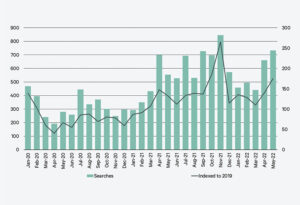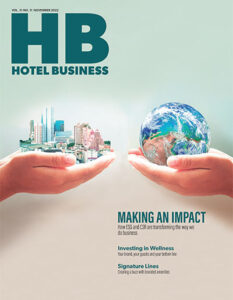By Stefani C. O’Connor
Contributing Writer
So, there you are, walking along the beach, perhaps checking the seaside property you’ve just invested in or decided to manage. Maybe you’re seeing how that PIP turned out, or if construction on that new brand prototype looks like what was in the prospectus. Or could you possibly, just possibly, be on vacation?
Right now, the purpose doesn’t matter. What does is what you see ahead on the sand—a struggle between life and death. You move quickly, stretching out your arms and putting your hands around the tiny body to turn it over. Now righted, the baby sea turtle heads into the ocean. Crisis mitigated.
Congratulations. You already understand the essence of ESG and CSR: to do the right thing.
The trendy acronyms for Environmental, Social and Governance and Corporate Social Responsibility have come to represent the yardsticks by which investors, customers, employees, suppliers, competitors, social media habitués and other stakeholders are judging the inherent worth of a company as an “aware global citizen” rather than just a successful money-making machine.
While apparent in companies worldwide, ESG and CSR, plus DEI (Diversity, Equity and Inclusion) have found particularly strong advocacy within the hospitality industry and among players of every stripe, from publicly traded mega-chains, to independent operators, to the managers of the 60-room hotel right past the highway off-ramp. Also in the mix are the industry’s key auxiliary partners, e.g., lenders, designers, construction companies, stats trackers, meeting planners, et al. The modi operandi also have become the hot topics at industry conferences now that those are back as the pandemic has eased.
Indeed, many feel the pandemic itself caused the acceleration of these pathways and the need for many hospitality companies to have stated goals of where they intend to be vis-à-vis ESG, DEI and CSR in both the near- and far-term.
Witness a recent report by CBRE on the hotel industry’s ESG initiatives that cited several interesting indicators, notably:
• Since February 2021, the amount of searches on terms such as environmental hotel, green hotel and eco-hotel have remained above 2019.
• More than 50% of travelers surveyed say that environmental/sustainable considerations are essential when planning travel, according to Google Insights.
• According to Virtuoso, a network of luxury travel agencies, in April 2021, 82% of travelers said the pandemic has made them want “to travel more responsibly in the future.”
While it would seem the global health crisis has spurred a greater respect by the once-again traveling public for the environment and being sustainable, for the lodging industry, efforts toward ESG really are nothing new. The same could be said of some components of DEI and CSR.
Many of the industry’s leading players, as well as the companies they’ve absorbed over the years, have had for decades distinct programs dedicated to sustainability (e.g., Fairmont Hotels & Resorts’ Green Partnership Program/1990s), diversity (e.g., Marriott’s Diversity Ownership Initiative/2005) and community (e.g., Loews Hotels “Good Neighbor Policy”/1990). What has changed is the intensity, scope and reasons around today’s efforts.
One just needs to scan the contents of Marriott’s nearly 100-page 2022 progress report around its “Serve 360” initiatives under ESG to grasp how extensive endeavors have become. For instance, under Environment, the global chain’s focus is on energy, emissions, water, waste, sustainable buildings, adaptive-reuse, biodiversity and responsible sourcing. Social includes DEI; associate development; support and well-being; community impact; youth; refugees; human rights; and peace and cultural understanding. Governance targets board and ESG oversight; business ethics; data privacy and security; and public policy. Similar ambitious platforms and reports can be found among major and other lodging entities on their websites, usually under ESG and corporate responsibility links.

Guests are quite “in charge” if they park their electric vehicles at the Cambria Hotel Arundel Mills in Hanover, MD. The property is LEED Gold certified, and guests are offered free shuttle service in either a Tesla Model X (shown at the complimentary EV charging station) or Lincoln Navigator.
While it’s likely few veteran hoteliers could have thought biodiversity would be among their corporate concerns during their careers, many legacy hotel companies have taken an overarching approach to promulgating their efforts internally so everyone, from the property level to the C-suite, understands the mission and focus. At the same time, they’ve also recognized the need, in some cases, to have dedicated leaders and staff to wrangle the often-intertwined complexities of ESG, DEI and CSR.
Enhancing long-standing programs
At Choice Hotels International, Megan Brumagim is one such leader. Earlier this year, she was named VP/ESG to bring direction and cohesion in this space across the enterprise, its 22 brands and with franchisees.
“Before the decision was made to create this role, we had a number of efforts underway related to several of the core tenets of ESG, including programs around diversity and inclusion; volunteerism; community engagement; environmental sustainability; and strong governance,” she said, concurring that Choice has a history of supporting such initiatives going back multiple decades, and adding its CSR program has been a “cornerstone” of its culture for two decades.
“For nearly 20 years, we’ve been dedicated to making small-business ownership a reality for underrepresented and minority entrepreneurs through our emerging markets franchise development program,” Brumagim said. “To date, we’ve awarded more than 314 franchise agreements to underrepresented owners since the beginning of the program.”
Choice’s “Room to be Green” program, which includes energy and water conservation, waste reduction and sustainable product usage, has been in place more than 10 years and was enhanced this year. In 2015, the chain launched an anti-human trafficking training program.

In Connecticut, the 165-room Hotel Marcel New Haven, Tapestry Collection by Hilton utilizes renewable solar power sources to generate electricity for its common areas, restaurant, laundry, meeting rooms and guestrooms.
“All the data was pointing toward the growing importance of ESG among so many of our stakeholders, including investors, corporate clients, the current and future workforce, all the way up to our board,” said Brumagim. “And we needed to create some new ways of doing things to meet the expectations of all of these diverse stakeholders and stay ahead of the curve.”
Among long-standing efforts at IHG, its “Green Engage” system has been measuring hotel environmental performance for more than a decade, offering hoteliers reporting their monthly energy data across its 17 brands more than 200 solutions to assist in reducing environmental impact. In 2018, according to Chief Sustainability Officer Catherine Dolton, “We realized that we needed a more comprehensive and strategic approach to integrate the principles of responsible business across every aspect of our business versus the short-term targets we had in place. [In 2021], we launched our ‘Journey to Tomorrow’ 10-year responsible-business plan, which helps focus our efforts for greater positive impact for people, the planet and communities. With the launch of ‘Journey to Tomorrow,’ we also updated our company purpose from ‘True Hospitality for Everyone’ to ‘True Hospitality for Good’ to further emphasize the importance of positive impact for all the stakeholders we serve.”

CitizenM hosted an open call where artists with a connection to Miami could submit their artwork to appear in every bedroom in its two new hotels in the city. Winning pieces were selected by a panel of judges that included renowned artist Jen Stark, whose work is featured on the facade of citizenM Miami Brickell.
Similarly, at Hilton, its proprietary ESG management system, LightStay, has been in effect since 2009. Originally designed to track environmental data, the platform has evolved to measure, manage and report all of Hilton’s environmental (energy, carbon, water, waste) and social performance (for example, the impact hotels have when providing volunteers or helping those in need within their communities). It was given “Recognized Standard” status in 2019 by the Global Sustainable Tourism Council.
“As of the end of 2021, LightStay data indicated that we have reduced carbon emissions intensity across our portfolio of hotels by 43% as compared to our 2008 baseline,” said Jean Garris Hand, VP/global ESG. “That means, in 2021 alone, we have avoided the emissions equivalent to taking about 585,000 cars off the road. LightStay also allows us to measure our community impact and shows that Hilton properties have logged more than 1.8 million volunteer hours in their local communities since 2017.”
For Klaas van Lookeren Campagne, CEO, Netherlands-based citizenM, the hotel company’s values and ESG efforts have been inextricably linked since the upscale brand was launched by Rattan Chadha in 2008.
“We set our vision of influencing positive change in a world where we are simply guests early on in our journey,” said van Lookeren Campagne. “We understand that we are guests on the planet and whilst we are a business, we knew that building in any neighborhood came with a responsibility to do the right thing for our people and communities. We know that our guests care about sustainability and because we own all of our real estate, we really can make a difference.”
With 29 properties—11 open in the U.S. and more under development—citizenM’s environmental footprint is relatively small in comparison to lodging’s mega-chains; however, van Lookeren Campagne is no less rabid about advancing ESG/CSR than his peers.
“We very much see value in ESG, as it’s driven by data-driven reporting, meeting stakeholder needs, goal-setting and accountability,” he said. “We also know that our guests and employees want to hear about who we are as a brand and our culture of real caring, which is reflected in our employee programs and the social impacts we have.”
Marking its 75th anniversary this year, Outrigger Hospitality Group could likely school any number of lodging industry players on ESG. Founded on Waikiki, HI, post-World War II, the company’s portfolio of 33 properties (seven outside the U.S.) are largely located in destinations where palm trees come standard.

By adding solar panels to its roof, the Holiday Inn Express & Suites St. George North-Zion in Washington is demonstrating its commitment to lowering its greenhouse gas emissions, according to IHG.
President/CEO Jeff Wagoner said the company’s authenticity in the ESG space “stems from our corporate compass, ‘The Outrigger Way,’ a tripod of caring for our hosts (i.e., employees), our guests and the places we do business.” The CEO noted this platform was created in large part by native Hawaiian Dr. George Kanahele nearly 25 years ago and remains as a company cornerstone. “The brilliance of this seemingly simple notion is that all three legs of the trio need to be cared for and cultivated for the company to remain in balance,” said Wagoner. “Our ESG initiatives align with our foundation of caring for our people and caring for our planet. With our goal of being ‘The Premier Beach Resort Company in the World,’ our link to oceans is unbreakable. We see firsthand that healthy oceans create healthy communities, which is why our ESG focus has a heavy slant on initiatives and partnerships connected to the preservation and protection of coral reefs and healthy oceans.”
Since 2014, the company has had a global conservation program called Outrigger ZONE (OZONE). Signature experiences include coral planting, beach cleanups and educational activities.
“Since its inception, we have preserved, planted and protected more than 100 football fields worth of coral,” said Wagoner. “We also were the pioneer hospitality brand to promote reef-safe sunscreen to guests, which has since become law in Hawaii [effective Jan. 1, 2021].”
Why hospitality? Why now?
So, with these and the other efforts mentioned in place for years, why does it seem ESG, DEI and CSR have gained such urgency in being inculcated across hospitality? Some observers point to the ethos of the current generation or the impact of being called out on social media for “bad” corporate behavior. According to Greg Friedman, CEO/managing principal, Peachtree Group, there are three drivers pushing ESG/DEI: social impact, investor expectations and regulatory changes.
“Millennials are the largest workforce in U.S. history, and Gen Z will be the most educated and diverse generation so far. Companies with ESG-informed business practices and policies will attract top talent,” he said, noting “Diversity leads to better outcomes.”
The company’s hospitality division includes a management company that operates some 80 hotels across 23 brands, and Friedman observed if company values resonate, team members will likely stay longer and perform better.

The AC by Marriott brand offers glass carafes at each hydration station (pictured) on guestroom floors to allow guests access to ice and water while eliminating the need to use plastic.
“Ultimately, striving to increase workplace diversity is a good business decision…working with people who are different from you challenges you and sharpens your performance,” said Friedman. “Achieving success in ESG and DEI can have significant benefits, including employee engagement and retention, a more substantial corporate reputation and better access to capital.”
Additionally, said the CEO, investors utilize ESG in their analysis and want to engage with companies that promote corporate governance practices consistent with long-term value creation.
There’s also greater societal recognition of the importance of ESG/DEI components, and Friedman said new laws are being enacted to create environmentally sustainable and resilient properties.
“Specific to hotels, the operators are focused on four key areas: water conservation, energy efficiency, carbon emissions and waste reduction,” he said, noting an arm of Peachtree’s commercial lending division, Stonehill PACE, “helps these operators make these sustainable changes possible through commercial property-assessed clean energy financing (C-PACE). As only some states allow this financing, we advocate for greater adoption of C-PACE across the country.”
Peachtree itself is actively building hotels in opportunity zones, areas designated by the U.S. Department of the Treasury as economically distressed.
“Investing in opportunity zones can have a positive impact on low-income communities in impoverished areas, as they can boost economic growth and job creation. Different projects will have varying levels of impact, but hotels as an operating business we know create good local jobs for the community,” said Friedman, noting the company’s new-build Baltimore SpringHill Suites redefined a blighted downtown section to a robust community.
“We know there is value in doing the right thing across all aspects of our business, which is why we made tremendous efforts to further integrate environmental, social and governance efforts into our business strategy,” said the CEO. Part of that includes providing team members with a living wage, encouraging work-life balance through paying for team members to take vacations and offering a paid parental leave benefit. It also launched an employee resource group that focuses on women.
“With ESG/DEI initiatives becoming embedded in our processes, we are better positioned to confront the unexpected and continue creating sustainable and impactful value,” said Friedman.
In some instances, industry chatter has classified the “new” ESG/DEI/CSR dynamic as too intense, too complicated or too much, which for some, could be too true. Which is likely why a majority of hotel companies have set multiyear plans in place with a target year to achieve their goals and are monitoring their progress and reporting on advances.
Choice’s Brumagim said, “It can feel overwhelming trying to tackle the wide span of ESG issues,” but advised, “the most important thing is to get started.”
“For companies or small business owners who are just starting to think about ESG, I’d suggest starting small, by picking just one topic that is most relevant to your business…,” said Brumagim. “Start measuring your progress, using the data to help you identify your biggest opportunities. And keep listening to your stakeholders along the way because they’ll tell you what’s most important to them.”
Right now, the company is supporting key national partners through corporate philanthropy and enabling guests to donate Choice Privileges points to its partner organizations, which include the American Red Cross and Operation Homefront, which supports military families in need.

New laws are being enacted to create environmentally sustainable and resilient properties. Peachtree Group’s Stonehill PACE helps operators make sustainable changes possible through commercial property assessed clean energy financing (C-PACE). Wrangling the deal for the citizenM Los Angeles helped finance C-PACE eligible costs, such as HVAC, lighting, mechanical and electrical.
As part of its Diversity, Equity & Belonging program, it’s partnering with The Executive Leadership Council to sponsor scholarships for students at historically Black colleges and universities (HBCUs), and partnering with Concord Hospitality to offer a bridge from HBCUs into hospitality leadership roles. Earlier this year, it launched HerTels by Choice Hotels to focus on advancing and empowering female entrepreneurs via mentorship, training and financial assistance.
“We’re also very proud to support our franchisees in making an impact in their local communities through the ‘Your Community, Your Choice’ franchisee grant program,” said Brumagim. “Last year, we awarded 10 franchisees grants of $5,000 each to support a local cause or charity of their choice.”
She added, “The biggest ask we hear from hotel owners for any program, including our ESG initiatives, is to ensure ROI is top of mind. We take that ask very seriously and fold it into our thinking from the beginning stages of any project.”
Brumagim noted one of the challenges of corporate citizenship is showing the ROI of making sustainability and ESG-related investments. “Sometimes the ROI is clear, but often it’s not, perhaps because the payback rests on variable assumptions about demand and costs, or because the technology is still relatively new in the market,” she said. “But there is so much innovation happening in this space. I’m optimistic that we’ll see even more solutions coming to market to help catalyze the transition to a lower carbon economy.”
She also stressed every company is at a different point on their journey “and there is no one-size-fits-all answer [and]no silver bullet.”
Setting ESG targets
Asked if there are distinct starting points in the process of “getting good” at ESG, Hilton’s Garris Hand said, “Creating measurable impact and making progress toward your ESG goals is a complex puzzle to solve, but it all starts with data. You need data to identify a baseline benchmark against competitors and set targets.”
She noted such an initial step serves to ensure “transparent, measurable and intentional progress against each aspect of the E, S and G in a way that is meaningful” to a company. “In today’s modern, connected and ever-changing world, it is not enough to just lower your carbon footprint,” she said. “You need to have goals that support your organization’s positive environmental and social impact, as well as a governance structure to support it.”

At Outrigger Hospitality Group’s Castaway Island property in Fiji, an environment officer orchestrates coral planting and excursions for guests and hosts as a signature experience.
Toward this, Hilton recently invested in venture capital firm Fifth Wall’s climate technology fund that will invest in software, hardware, renewable energy, energy storage, smart buildings and carbon sequestration technologies to decarbonize the real estate industry. “[It’s] another example of where we are working to be on the leading edge of decarbonization innovations that will pave the way toward a net-zero future,” said Garris Hand.
She also cited the opening earlier this year of the Hotel Marcel New Haven (CT), part of Hilton’s Tapestry Collection, which utilizes renewable solar power sources on site to generate the electricity needed for its common areas, restaurant, laundry, meeting rooms and 165 guestrooms and suites.
Much of ESG is a work in progress, particularly within hospitality, which is often impacted by global events and influences, economic and otherwise, and companies are not being smug about reevaluating stated goals.
In 2018, Hilton launched “Travel with Purpose,” a group of strategies across its ESG platform designed to measure the company’s impact and track its progress to meet specific goals by 2030, among them a commitment to cutting its environmental footprint by 50% while also doubling its social-impact investment. This year, said Garris Hand, Hilton announced “strengthened greenhouse gas emissions targets, which aim to cut emissions intensity by 75% in its managed hotels and emissions intensity by 56% in its franchised hotels by 2030. These new targets have been validated by the Science Based Targets initiative (SBTi), a global body enabling businesses to set ambitious emissions reductions targets in line with the latest climate science.”
She noted Hilton— for the fifth year running—has been named to the World and North American Dow Jones Sustainability Indices, which ranks corporate sustainability performance.
An ongoing process
“ESG will always be a process. For IHG, this entails focusing on the priorities that will have the most positive impact, improving how we measure progress, and being able to support leaders across the business on this journey,” said Dolton, noting the company regularly conducts a materiality assessment. “This looks at not only what is important to our stakeholders and to the long-term success of IHG, but also where exactly we can have the most impact.”
She added IHG’s 2020 assessment played a key role in shaping its 2030 “Journey to Tomorrow” plan.
One “Journey” initiative is IHG’s partnership with consumer goods company Unilever to replace bathroom miniatures with bulk amenities in more than 4,000 hotels and builds on IHG’s promise in 2019 to do so.
“This partnership is a major step in IHG’s pledge to eliminate single-use items, or move to reusable or recyclable alternatives, across the guest stay by 2030,” said Dolton. “The switch to full-size formats is expected to save at least 850 tons of plastic annually in IHG’s Americas region alone— the equivalent weight of five fully grown blue whales or 70 double-decker London buses.”
Dolton noted franchisees play a crucial role in its efforts. “Our aspirational goals would be hollow without franchisee implementation,” she said, noting the IHG Owners Association has a Sustainability Committee charged with leading collaboration with the company on environmental strategy. “Our franchisees also partner with us and provide feedback by participating in pilots to determine the potential for new technologies, [such as]smart thermostats, to work as intended in a hotel environment,” she said.
For example, IHG headquarters office in Atlanta is partnering with food-waste-solutions company Goodr to help combat food insecurity by serving the local community through pop-up grocery stores and meal and snack packing. Additionally, the Crowne Plaza Atlanta Perimeter at Ravinia was the first IHG hotel to partner with Goodr to rescue its surplus food. “The next step in the IHG and Goodr partnership is to get more hotels signed up for this service,” said Dolton. “In Q1 2023, IHG hopes to launch a 10-hotel pilot across the U.S. This will allow hotels to try the program while IHG finances up to four food waste pickups per month.
“We see benefits and returns for our investments in corporate responsibility in many ways for different stakeholders across our business,” she added. “For hotel owners, we aim to deliver savings through energy efficiency and water reductions. For investors, our Journey to Tomorrow is an indication of responsible and prudent management. As our B2B customers are looking for their suppliers to support them in their ESG commitments, our progress against our goals will help position our brands and hotels as the partner of choice for responsible travel. Finally, today’s workforce is looking for employers to share their values, and we are seeing more and more interviewees reference IHG’s Journey to Tomorrow as a key reason for wanting to work for IHG.”
CitizenM has the distinction for the second year in a row of receiving a five-star rating from GRESB, a global benchmarking organization that provides validated and scored ESG data to financial markets. However, it’s not something van Lookeren Campagne suggests offers entitlement to laurel-resting.
“While only 20% of entrants achieve the five-star rating, maintaining the rating takes continuous work,” said the CEO. “This recognition reflects our continued dedication to ESG efforts; however, while it’s great to see efforts being rewarded, there is an urgency for more work to be done. The planet and our conscious travelers can’t wait.”
Likewise, “getting good” at ESG is a continuous cycle of mapping the company’s impacts and implementing steady improvements, according to van Lookeren Campagne. “These improvements are made by integrating ESG in everyone’s personal goals at citizenM. Having a clear direction and understanding of the impacts and opportunities of each material ESG topic has been a top priority,” he said, adding the company is committed to listening and acting on guest feedback as well.
“When guests say ‘no’ to a room cleaning, we donate directly to our citizenMovement foundation, which is focused on charitable projects that shorten the distance between people and opportunity,” he said. “In addition to the donation, there is a benefit to the environment. Less room cleaning means we take fewer trips to our laundry provider (reducing emissions), and use less energy, water, detergents and cleaning supplies.”
The CEO admitted getting citizenM’s data in order “was challenging— from data quality and coverage to selecting the right platforms, technologies and processes. We invested a lot of time and ongoing effort in the credibility of our ESG data; this is helped by the fact that we own and operate our hotels.”
And, notably, hotel projects under consideration—new-builds or conversions—must achieve specific BREEAM and LEED designations in order to emerge as citizenM properties.
As the company expands in the U.S., van Lookeren Campagne intends to use the same ESG strategies across all markets, but recognized “the level of awareness, regulation and integration of ESG is more advanced in some markets than others. For example, waste data is still a challenge in the U.S. because waste providers are not set up to give the level of detail we are looking for.”
Additionally, citizenM has a pillar focused on making positive movements in society. “We also believe in supporting local community activities that resonate with our values and culture,” said van Lookeren Campagne “For example, to support the opening of our new hotels in 2022, we launched a ‘citizens of the world’ content series to celebrate the creative and diverse communities in each of the cities we opened in. The series spotlights five individuals across five pillars (art, business, culture, fashion and party), sharing their stories with our guests in the hopes of creating a connection to the core of each city via the creative, talented people that make up its fabric. The content takes the form of mini docu-films, portraits, podcast episodes and activations at our hotels.”
Whether a pillar like that could be used by other hospitality entities to support their ESG platforms is not certain, and spotlights one reason the industry may consider some current ESG efforts “complicated.”
“There’s not a singular path of established ESG categories with uniform reporting systems,” said Outrigger’s Wagoner, “So each company needs to drill down on the topics that are most valuable to their organization. Second, there’s no ESG finish line. Sure, hard targets are made for certain categories such as reduction of water or level of cybersecurity deployed, but the value in this system comes from being dynamic and working with various stakeholders to target where positive change can be made. Again, the value of ESG comes from consistent metrics that track the ebbs and flows of progress.”
Outrigger this past summer did an in-depth baseline analysis, then used it to refresh its ESG initiatives company-wide. “We strive to ensure that our investments generate a measurable, positive social and environmental impact, alongside a financial return,” he said. “Updating our ESG platform with tightened metrics and universal reporting system helps to ensure that we’re being efficient and effective in this arena.”
Outrigger currently has 23 categories it tracks under ESG. “E’s” key elements include carbon offsetting and reduction of energy, water and waste, alongside nature conservation and restoration. Key elements in its “S” category include equal representation/DEI, community engagement, buying local and philanthropic partnerships that range from supporting cultural activities and artists to nonprofit organizations connected to OZONE (which earned the Pacific Asia Travel Association Gold award in 2020 in the Climate Change category.) The “G” category focuses on ethical business practices, transparency and accountability, with a heavy focus on cybersecurity.
This year, the company also established The OutriggerCARES Foundation as a 501c3 non-profit organization to assist its employees in times of need.
“Our resorts in Hawaii, Fiji, Mauritius, Thailand and the Maldives all have very different footprints and property needs, so it’s tricky to find a one-size-fits-all solution for ESG initiatives,” said Wagoner. “What we have found works well is focusing on some core elements for all properties, such as reduction of energy, water and waste, then allowing properties to have areas of specialization.”
At property level
Most of the executives agreed that getting buy-in at the property level regarding ESG/CSR efforts was not a contentious issue. For example, Atlanta-based management company HVMG (Hospitality Ventures Management Group) includes brand and independent properties in its portfolio and is engaged with the respective proprietary franchisor ESG/DEI/CSR platforms. Case in point is the 142-room AC Hotel by Marriott Durham in North Carolina. Opened in July 2021, the property is led by General Manager David Press, who stressed since its doors opened, intentions were to “not only keep up but lead where possible” in ESG and CSR.
“Ways we’ve worked toward Marriott’s overall goals [include]energy-conservation practices, from installation of high-efficiency lighting with automation in our lobby and motion detection in the back of house to waste reduction through offering guestroom recycling, as well as public space and heart-of-house recycling,” said Press, noting the AC brand offers glass carafes at hydration stations on guestroom floors to allow access to ice and water while eliminating the need to use plastic. “Another way we’re able to lower energy consumption is by interfacing our thermostats with the property management system and motion detection. This, paired with our operation team, helps continuously monitor the degree setting by season.” The property also installed 1.3 gpm faucets, 2.5 gpm flow rate of showerheads and dual-option .8/1.6 gpf toilets in all guestrooms.
Press said he values and relies on feedback from guests, meeting planners, owners, the management company and associates regarding ESG/CSR. “It is not uncommon for an RFP to come through that is heavily weighted on what our community footprint is, and we hold ourselves accountable to that…,” he said. “We are proud to have opened our doors with the right intentions, having educated the staff through the process, and knowing we are committed to ESG/CSR.
“As a GM, I want the best outcome for my associates, community, owner and management company. When all those align, it is not difficult to achieve,” said Press. “In past years, while we all experienced staffing challenges during the pandemic, some ESG education efforts of new staff could be pushed to the side. The biggest obstacle is our front-line staff not understanding the ‘why.’ I want my team to have a sense of ownership in what they do every day. I encourage my team to see the value in investing extra time in helping internal and external clients understand our motives. They may not see the ROI on a monthly basis, but they feel the ethical responsibility.”
And isn’t ethical responsibility the reason why you turned over that little sea turtle?




